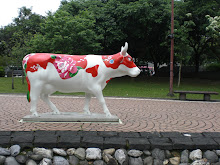
The opening of the International Naturist Federation's 32nd World Congress at the Calabrian camping of Pizzo Greco is just hours away.
Asianaturist will not be there, but we thought it interesting to see what kind of topics such a congress discusses. Apart from obvious elections of top officials and changes in the rules which only member organizations care about, there will also be a series of roundtable discussions hosted by members of the Italian naturist federation, Fenait.
Most of the topics feature the relationship between naturism on the one hand, and ecologism or "non-naturist" nudity on the other hand. Since naturism was founded a long time ago mainly as a health movement, and as a movement of going back to nature amid rapid industrial development, it is only normal for naturism today to reflect on its relationship with the new version of that concern, now titled of course ecologism or environmentalism.
The first roundtable at Pizzo Greco deals with naturism and vegetarianism. Fenait magazine Info Naturista says the group will not take a stance in favor of against vegetarianism, it will only elaborate on the links of naturism with the food movement. Personally, I don't think there should be a link. Naturism and vegetarianism are two separate ideas, and can be linked by individuals, but should become automatic or compulsory. A naturist movement that insists on vegetarianism will lose a lot of support without gaining much on the other side.
A second roundtable deals with the wider conflict between what Fenait calls "ethical naturism" and commercial naturism. The former was the idea of the founding members of the movement: going to live in the middle of nature, in what people today still call "naturist camps," with a simple lifestyle in harmony with nature. The latter is the form of naturism that dominates today: the operation of large or at least comfortable naturist resorts, where one can enjoy all the comforts of modern society, such as buffet lunches, large swimming pools, sauna, supermarket, Internet connections. The discussion will also emphasize ethical naturism as a lifestyle, i.e. it means naturism and nudity is not something just for the holidays, it continues back at home, away from the resorts. The discussion will seek an answer to the question of what today's naturists want the most. One of the topics to come up is the falling numbers of members in naturist associations: people go on holiday to resorts and hotels, but do not join associations that would allow them to live the naturist life outside of the holidays. In that light, the difference between naturists and nudists will also be discussed, with the latter being seen as more superficial, just being nude without any further philosophical dimension.
Naturism and ecology is the theme of the third roundtable. The link is logical, since the early naturists emphasized respect for nature, flora and fauna, in particular at naturist club areas. The discussion also wants to bring the naturist movement closer to the environmentalist movement.
A final roundtable handles the different perceptions of naturism and being nude in the eyes of men and women. Recruiting enough women to naturism has always been a problem. Often the male partner will first join out of interest, the female partner will be either inimical or indifferent, and only make her move later. The purpose of the roundtable, Fenait says, is to provide arguments against those in Italy and elsewhere who think naturism is not suitable for men, women and children.
Since the World Congress starts today, I expect to report more and also to find reports in the international media I can refer to in my next postings. Too bad I can't be there myself.
Labels: Fenait, INF, naturism, nudism, Pizzo Greco, vegetarianism



